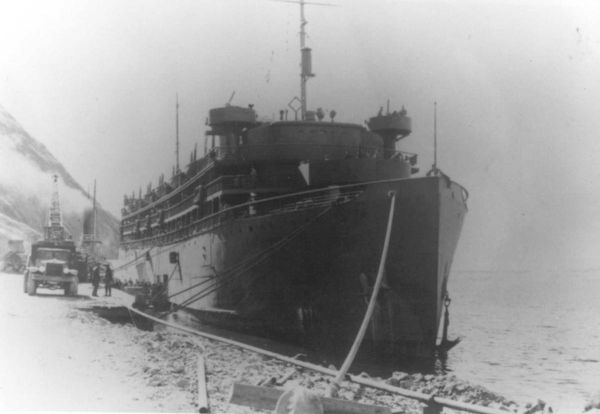“For God and Country” is the U.S. Army chaplain motto, and this motto was perfectly displayed by an interfaith act of heroism during World War II. Four Chaplains Day, observed on February 3, honors the sacrifices made by chaplains George Fox, Alexander Goode, Clark Poling and John Washington.
When tragedy struck
The U.S.A.T. Dorchester was used as a luxury coastal liner, but during World War II it transformed into an Army transport ship. On February 3, 1943, it was filled to capacity with 902 servicemen, merchant seamen and civilian workers. It was traveling from Newfoundland to an American base in Greenland as one of three ships in the SG-19 convoy.
Known as Torpedo Junction, the icy waters of the North Atlantic were especially treacherous because the Germans relentlessly surveyed this corridor, attacking and sinking many ships. Because of this, the Dorchester’s captain had ordered passengers to sleep in their clothes and life jackets—but many chose not to heed his warning.
Unknown to the Dorchester, it was targeted by an enemy submarine. At 12:55 a.m., a German U-223 zeroed in on the Dorchester, firing three torpedoes. One hit with deadly accuracy, striking the boiler room. Immediately, the Dorchester’s electric supply was out. Steam and gas filled the ship.
Panicking passengers overcrowded the lifeboats, overturning many of them. Rafts were carelessly released into the ocean, floating away before anyone could take advantage of them. Life jackets quickly ran out.
Those on board would have only 20 minutes before the ship disappeared into the ocean.
‘Unity without uniformity’
As frantic crew and passengers scrambled to make sense of the situation, four military chaplains sprang into action. Fox, Goode, Poling and Washington spread out among the men on the ship.
The four men represented different faiths. George Fox was Methodist, Alexander Goode was Jewish, Clark Poling was Dutch Reformed and John Washington was Roman Catholic. As the emergency unfolded before them, they worked together and did exactly what they were called to do. They calmed nerves, shared encouragement, offered prayers and sacrificed their own safety for others.
In the end, of the 900-plus men on the ship, 672 died. Among the 132 survivors were countless shared stories of the chaplains’ faith and sacrifice.
Clinging to life in a sea of oil and debris, Private William B. Bednar later said, “I could hear men crying, pleading, praying. I could also hear the chaplains preaching courage. Their voices were the only thing that kept me going.”
The chaplains prayed with the injured and dying. They guided the living to lifeboats. They sacrificed their life jackets, gloves and more for the safety of others.
Another survivor, John Ladd, said, “It was the finest thing I have seen or hope to see this side of heaven.”
As nearby boats worked to rescue the men that they could, the four chaplains were seen standing arm in arm, praying on the deck of the ship. According to the Four Chaplains Memorial Foundation, these men exemplified “unity without uniformity”—an interfaith understanding and cooperation.
In prayer, the chaplains went down with the Dorchester.
Remembering their heroism
On December 19, 1944, all four men were posthumously recognized with the Distinguished Service Cross and Purple Heart. The award went to the next of kin during a ceremony at the post chapel at Fort Myer, Virginia.
Additionally, a one-time Special Medal for Heroism was later authorized by Congress. This honor was bestowed to the families by President Dwight Eisenhower on January 18, 1961.
Today, there are several permanent displays honoring the chaplains. Beautiful stained-glass windows tell of their sacrifice at the Army War College, the base chapel at Fort Snelling, the base chapel West Point and the U.S. Army Chaplains Center at Fort Jackson, South Carolina.
Their story lives on as a perfect example of selflessness and service. Today, military chaplains strive to live and serve the military in the same way, providing religious expression and spiritual guidance for all faiths.





